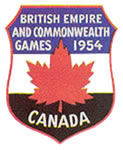Related Research Articles

Sir Murray Gordon Halberg was a New Zealand middle-distance runner who won the gold medal in the 5000 metres event at the 1960 Olympics. He also won gold medals in the 3 miles events at the 1958 and 1962 Commonwealth Games. He worked for the welfare of children with disabilities since he founded the Halberg Trust in 1963.

The 1954 British Empire and Commonwealth Games were held in Vancouver, British Columbia, from 30 July to 7 August 1954. This was the fifth edition of the event that would eventually become known as the Commonwealth Games, the second post-war Games, the second Canadian Games after the inaugural event in Hamilton and the first event since the name change from British Empire Games took effect in 1952.

Edward Russell Mockridge was a racing cyclist from Geelong, Victoria, Australia. He died during a race, in collision with a bus.

New Zealand at the 1950 British Empire Games was represented by a team of 175 competitors and 24 officials. Selection of the host nation's team for the Games in Auckland, was the responsibility of the New Zealand Olympic and British Empire Games Association. New Zealand's flagbearer at the opening ceremony was Harold Nelson. The New Zealand team finished third on the medal table, winning a total of 53 medals, 10 of which were gold.
John Brown was a New Zealand cyclist who won a silver medal at the 1938 British Empire Games.
James "Ham" Pirret was a New Zealand lawn bowls player.
Leslie Percival Lock was a New Zealand racing cyclist.
Bruce Ronald "Tony" George was a New Zealand weightlifter, who won medals for his country at two British Empire Games.
Gordon Henry Hobson was a New Zealand amateur wrestler. He represented his country at the 1950 British Empire Games and the 1958 British Empire and Commonwealth Games, winning a bronze medal in the lightweight division in 1950. During his career, he won five national wrestling titles.
Harry Dale Kent was a New Zealand track cyclist. He was the first New Zealander to win a gold medal in cycling at the Commonwealth Games, as well as the first cyclist from the country to medal at the UCI Track Cycling World Championships.
John Maxwell Carr was a New Zealand field athlete and coach, athletics official, and air force officer. He represented his country at the 1950 and 1954 British Empire and Commonwealth Games, and served as a wing commander in the Royal New Zealand Air Force. In later years, he won three World Masters hammer throw titles.

Frank John Grose was a New Zealand road and track cyclist who represented his country at the 1934 and 1938 British Empire Games.
Raymond Leslie Puckett is a former New Zealand distance runner, who represented his country at the Olympic Games in 1960 and 1964, and at the 1958 British Empire and Commonwealth Games. Coached by Arthur Lydiard, Puckett was the first New Zealander to complete a marathon in under two hours and 30 minutes.

Peter Wells was a British-born athlete who competed in the High Jump at the 1952 and 1956 Summer Olympics.
Harcourt Richard Godfrey was a New Zealand wrestler who represented his country at the 1938 British Empire Games.
Elizabeth Oakes Mitchell was a New Zealand fencer who competed at the 1958 British Empire and Commonwealth Games.
Clifford Simpson was a New Zealand middle-distance athlete who represented his country at the 1950 British Empire Games. He also played representative rugby union for South Otago.
Edward Leonard Graham Hughes was a New Zealand racing cyclist.
Michael John McRedmond is a New Zealand cycling coach and former racing cyclist who won a silver medal competing for his country at the 1982 Commonwealth Games.
John Monaghan was a New Zealand amateur wrestler. He represented his country at the 1950 British Empire Games and the 1954 World Wrestling Championships, and won 10 national wrestling titles.
References
- 1 2 "Death search: registration number 2011/23262". Births, deaths & marriages online. Department of Internal Affairs. Retrieved 14 December 2021.
- ↑ "Births". Manawatu Standard. Vol. 53, no. 115. 12 April 1933. p. 1. Retrieved 14 December 2021.
- 1 2 3 4 5 6 Lampp, Peter (17 December 2020). "Manawatū cycling great Lance Payne could endure the pain". Manawatū Standard. Retrieved 14 December 2021.
- ↑ "National road titles". The Press. Vol. 90, no. 27465. 27 September 1954. p. 12. Retrieved 14 December 2021.
- ↑ "Cycling road race". The Press. Vol. 90, no. 27423. 9 August 1954. p. 11. Retrieved 14 December 2021.
- ↑ "England wins road race". The Press. Vol. 97, no. 28649. 28 July 1958. p. 13. Retrieved 14 December 2021.